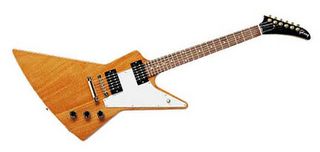Gibson Guitar Axed In TTAB "EXP" 2(d) Cancellations
J. D'Addario & Co. need no longer fret over the fate of its trademark registrations for the marks EXP and EXP COATED for "strings for musical instruments." The Board gave the axe to Gibson Guitar's petitions to cancel those registrations in Gibson Guitar Corp. v. J. D'Addario & Co., Cancellations Nos. 92041175 and 92041688 (February 17, 2005) [not citable]. As petitioner, Gibson had the burden to establish its case for cancellation by a preponderance of the evidence, but it failed to carry that weight.

For its first use date, D'Addario relied on the filing date of the applications that issued as the subject registrations: December 8, 2000. Gibson claimed common law rights in EXP for guitars dating from at least September 15, 1993, but its proofs were inadequate to support the claim.
Reviewing the record evidence in detail, the Board noted that all of Gibson's uses involved the term EXP accompanied by other letters and/or numbers, primarily as part of a model abbreviation for its EXPLORER brand guitars. The Board was therefore "hard pressed" to find technical trademark use of EXP: "There is no evidence that petitioner has used the term EXP by itself in any context prior to respondent's priority date."
"A key question, therefore, is whether petitioner has demonstrated that its use of EXP is use analogous to trademark use or that others use the term EXP to refer to petitioner's guitars."In order to rely upon use "analogous to trademark use," Gibson had to show that its use of EXP was "a public use . . . calculated to attract the attention of the viewer." Gibson provided no evidence of use of EXP in advertising, nor did it show that the media refers to its guitars as EXP. But it did submit price lists and invoices.
However, Gibson's price lists, even if shown to customers, "would not be calculated to reach a sizable segment of the public." As to its invoices, which were addressed to businesses, "it is not clear that the consumer, as opposed to the dealer, would actually see the invoice." Nor was it apparent to the Board that "even dealers would ordinarily surgically remove the 'EXP' from such Product No. entries as 'EXP2EBGH1' and 'EXP2KOGH1.'"

Looking at the evidence as a whole, the Board concluded that Gibson "at best" demonstrated:
"that it used the term EXP along with other letters and/or numbers on some price lists and invoices prior to respondent's priority date. Some of these documents may have been seen by prospective purchasers. [That] is simply not of the caliber of the evidence that shows that the term EXP's use was analogous to trademark use."Perhaps the lesson here is this: before you pick a fight based on common law trademark rights, make sure your proofs are well tuned, or you may wind up singing the blues.
Text ©John L. Welch 2005. All Rights Reserved.




0 Comments:
Post a Comment
<< Home